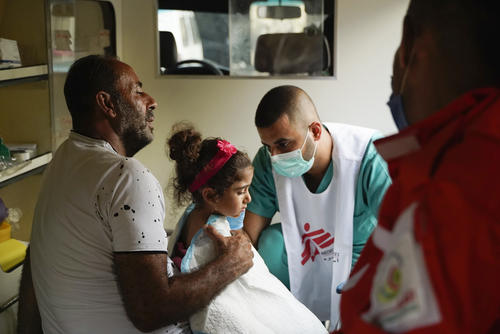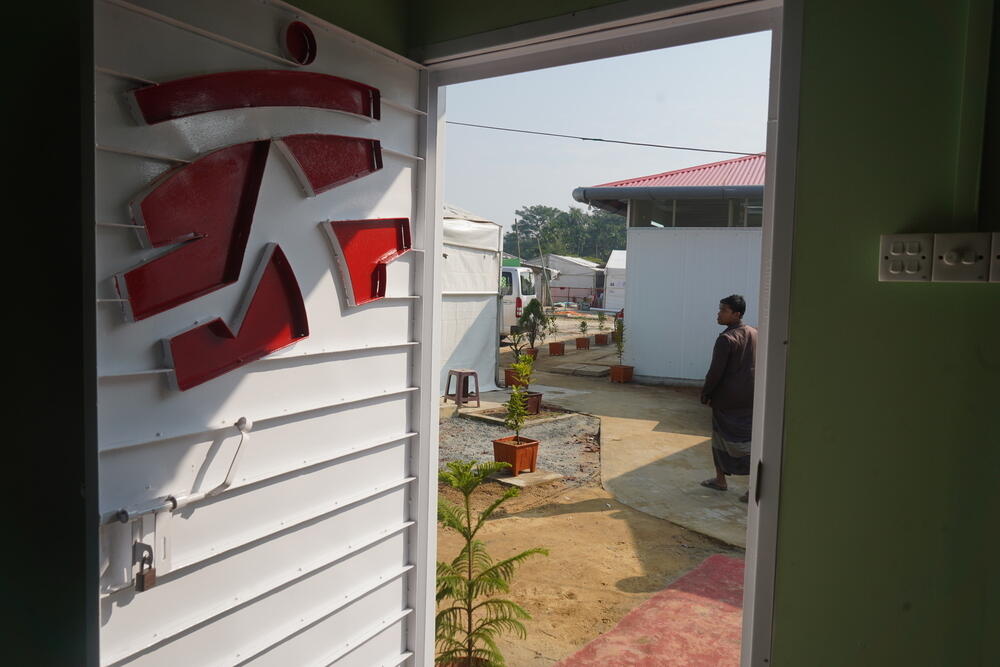Bangladesh: MSF sees huge spike in arrivals of war-wounded Rohingya from Myanmar
Médecins Sans Frontières / Doctors Without Borders (MSF) have seen escalating numbers of Rohingya people with violence-related injuries who have crossed the border into Bangladesh over the past week. This indicates a worsening humanitarian crisis in Myanmar’s Rakhine state.
In the four days leading up to 7 August, MSF teams in Cox’s Bazar refugee camp, Bangladesh, treated 39 people for violence-related injuries. More than 40 percent were women and children. Many had mortar shell injuries and gunshot wounds.
Numbers peaked on 6 August when MSF teams treated 21 wounded people. MSF staff at the clinic say this is the first time in a year that they have seen serious injuries on this scale.
"We are becoming increasingly concerned about the impact of the conflict on Rohingya people"
“Considering the rise in the number of wounded Rohingya patients crossing from Myanmar in recent days, and the nature of the injuries our teams are treating, we are becoming increasingly concerned about the impact of the conflict on Rohingya people,” says Orla Murphy, MSF’s country representative in Bangladesh.
“It is clear that safe space for civilians in Myanmar is shrinking more each day, with people caught up in the ongoing fighting and forced to make perilous journeys to Bangladesh to seek safety.”
Patients have described to MSF staff the desperate situation in Rakhine state. Some reported seeing people bombed while trying to find boats to cross the river into Bangladesh and escape the violence.
Others described seeing hundreds of dead bodies on the riverbanks. Many patients spoke of being separated from their families en route to safer areas, and of loved ones being killed in the violence. Many people said they were fearful that family members remaining in Myanmar would not survive.
Medical care where it's needed most
Help us care for people caught in the world's worst healthcare crises.

An escalating conflict
Conflict has been escalating in Rakhine state since October 2023, causing immense suffering to the Rohingya population and crippling the healthcare system.
“Our patients tell us that they faced extreme difficulties in accessing medical facilities in Myanmar due to the highly volatile situation there,” says Murphy.
The conflict has also impacted MSF’s ability to run medical activities safely. In June, MSF was forced to suspend its services in Northern Rakhine state because of the violence, depriving people of vital medical care and further deepening the humanitarian crisis.
MSF calls for the immediate protection of civilians caught up in the conflict. “People must not come under indiscriminate attack and should be allowed to leave for safer areas, while all those in need of vital medical care should have unhindered and sustained access to medical facilities,” says Murphy.
MSF in Bangladesh
Hundreds of thousands of Rohingya have sought refuge in Bangladesh but now live in a precarious situation.
Médecins Sans Frontières/Doctors Without Borders (MSF) has worked in Bangladesh since 1985 and in 2017 we rapidly scaled up our operations in Cox’s Bazar in response to a massive influx of refugees after a renewed wave of targeted violence by the Myanmar military.
In the overcrowded settlements where most Rohingya live, water and sanitation activities are an important part of our efforts to stop the spread of disease. Our clinic in Cox's Bazar offers comprehensive basic and emergency healthcare to Rohingya refugees and the local community.
We also run inpatient and laboratory services. In Kamrangirchar, a slum area in Dhaka, the capital of Bangladesh, we provide services including reproductive healthcare and support for survivors of sexual violence.
